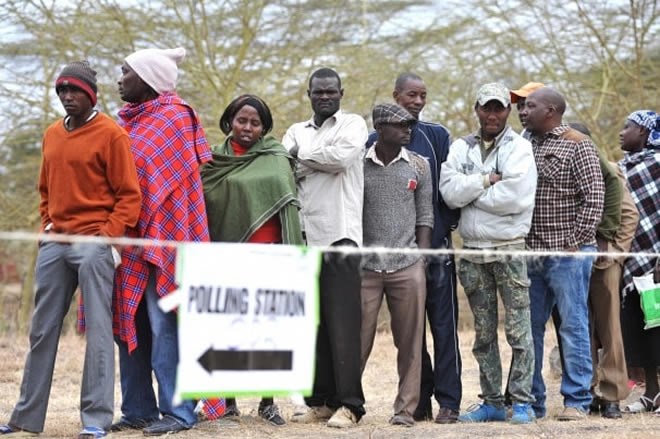
Tuesday August 8, 2017
By Kevin Sieff

Aug. 8, 2017 Voters line up to vote outside a polling station in Isinya. Riccardo Gangale/Bloomberg News
NAIROBI — Kenyan voters waited in line for hours Tuesday to decide a fiercely contested election for president, as concerns about possible ethnic violence put much of the country on edge.
The race — pitting incumbent President Uhuru Kenyatta, 55, against former prime minister Raila Odinga, 72 — spurred a large turnout across one of Africa’s most vibrant democracies. But Kenya has been torn by tribal clashes in the past, and Odinga has already told his supporters that he believed only fraud could stand in the way of victory.
The lines began forming before sunrise in Nairobi, snaking past the corrugated market stalls of its sprawling slums and the upscale apartment buildings in its ritzy suburbs. After months of nonstop campaigning, the country’s roads were lined with the billboards of political parties.
Kenya’s next president will take the helm of an economy that has outpaced the vast majority of countries on the continent. Kenya serves as a base for diplomats, businessmen and aid workers, who have come to see the country as an island of stability in a fragile region, bordering South Sudan and Somalia.
But it is nonetheless a country fraught with problems — corruption in the public sector, terrorism emanating from Somalia and tribalism that has led to sometimes dangerous political clashes. In 2007, post-election violence left about 1,400 people dead.
Although both Kenyatta and Odinga have produced lists of pledges and policy statements, “the race is almost exclusively about ethnic groups trying to hold on to power or take power,” said Murithi Mutiga, a researcher at the International Crisis Group.
Tensions have deepened in recent months, first with a torrent of incendiary fake news stories, and then, in late July, with the apparent murder of a top election official and rumors about vote rigging. Early in the campaign cycle, many assumed Kenyatta would win by a wide margin, but Odinga has inched closer, and recent polls show the two candidates neck and neck.
The tight race, coupled with concerns about vote rigging, made the prospect of violence a worry for many of those waiting in line at polling sites. Already, large numbers of people had fled Nairobi by bus to avoid possible fighting.
“Of course it’s on my mind after what happened in 2007,” said Edith Oketch, 35, who voted with her 10-month-old daughter clinging to her shoulder.
Oketch had avoided political rallies, fearing they might get out of hand, but on Tuesday there was no question that she would vote. She lined up at a polling center in a primary school near her home in Kibera, Kenya’s largest slum.
Oketch has a university degree in business administration, but like many Kenyans, she has struggled to find work, even as the economy has grown by more than 5 percent annually, the tech sector has blossomed and multinationals have opened offices in Nairobi. She now sells cereal and other food in the slum’s streets.
“You take your kid to school, you struggle, and in the end there is nothing in return,” Oketch said.
Her solution: She would vote out Kenyatta, hoping that Odinga would bring change. He had even chosen to cast his vote in the slum, a good sign, she thought.
But with Kenyan politics dictated mostly by tribal alliances, other polling sites in areas dominated by Kenyatta’s Kikuyu tribe were filled with voters who longed to keep the president in power.
Under Kenyatta’s rule, Aiddah Mungai’s life had improved dramatically. She started her own business — a bakery called The Cake Hub — and she watched as more and more customers came. Kenyatta had committed to modernizing the country, encouraging technological innovation, and Mungai had seen the results firsthand, she said.
“I registered my business online. I pay my yearly licensing fees online,” she said. “It’s so much easier than it was.”
But Mungai recognized that even her vote was about more than just Kenyatta’s leadership. Like the president, she too was Kikuyu.
“It’s a tribal thing here, no matter how much we say it’s not.”
It will likely take two or three days for the results of the election to be tabulated. Odinga has already said that he believes he will only lose if the vote is rigged, and it remains unclear how he or his supporters would respond to such a defeat. Odinga is running for his fourth — and likely last — time, adding pressure on his campaign.
Kenyans also voted for a range of local candidates Tuesday, including members of parliament. A 2010 constitution transferred significant power from the central government to local offices, in part with the hope of empowering groups and regions that have traditionally been marginalized from the political process.
In a statement Monday, former president Barack Obama weighed in on Kenya’s tribal tension, and the need for a peaceful vote.
“In Kenya’s election we have already seen too much incitement and appeals based on fear from all sides,” he said. “But I also know that the Kenyan people as a whole will be the losers if there is a descent into violence. You can make clear that you will reject those that want to deal in tribal and ethnic hatred.”
As polls closed Tuesday evening, the streets of Nairobi, normally packed during rush hour, were mostly empty. So far, international election observers have been positive about the vote.
“I’d give anything to have a turnout like this back home,” said Rep. Karen Bass (D-Calif.), who was part of the monitoring team for the National Democratic Institute, a U.S. nonprofit group.